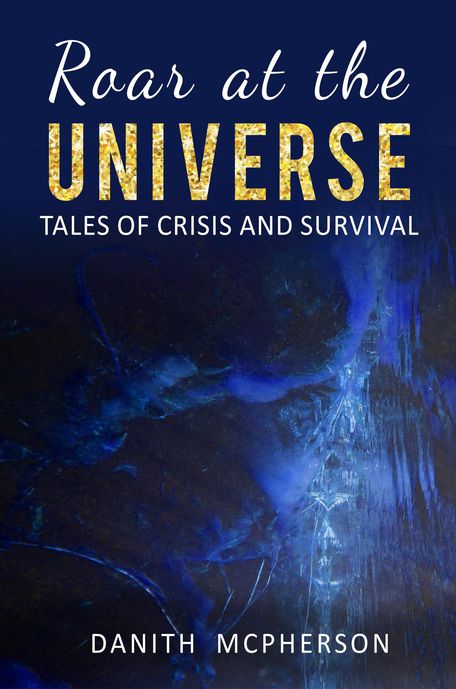Book Review: Roar at the Universe by Danith McPherson
In her introduction, the author states that bad stuff happens, and people can deal with it in different ways. This anthology, then, is eleven stories and poems about characters who struggle with the bad stuff in their lives, not always successfully.

“Folds of Blue Silk” starts the book with a woman on the moon who has a form of autism. When she’s normal, she’s a mathematical genius, but unable to care for herself and doesn’t understand the need for rest. Under the influence of Silk, she becomes much closer to neurotypical; but it’s still an experimental medication, and controlled by the same man who uses her mathematical talents for his own profits.
As a result, he gives her Silk only when he absolutely has to by law, and gets her normal self to sign contracts allowing him to use her talents indefinitely. The neurotypical self realizes that this is a form of slavery, but she’s on drugs, so her word doesn’t count. If only she can figure out a method to escape!
“Jonah” is a short poem about the Biblical prophet with a different outcome.
“The Universe Seen as a Floating Orange Rind” concerns Albert Wren, a man who is no longer considered young, but has never learned independence. His mother has finally kicked him out of the house to visit his aunt in Minneapolis. This aunt is glad to see Albert after a short absence, which is kind of weird as Albert’s never met her before.
Indeed, a lot of people in Minneapolis recognize Albert, not always favorably. Including the old man who gets into houses without opening doors, and says Albert’s reports are late. What on Earth is going on? This is a science fiction story, but the explanation is a bit more complicated than that.
“Pleiades” is a short poem about the stars as seen from Earth.
“Litany for Lost Heroes” is about miners on a colony world pressed into service as translators of sorts during a war against draconian aliens. But are the aliens the invaders, or the victims?
“Attic” is a slightly longer poem about memory and how crowded it can become.
“Shifting Spirits” is set post-apocalypse, when some people have gained the ability (or is it a curse?) of separating their spirits from their bodies, but if the spirit is gone too long, the body dies. An attempt to anchor one man’s spirit to his body has gone awry, and now he’s being hunted to cure or kill.
“The Night Lives Immense” is a poem about stargazing, probably.
“Roar at the Heart of the World” takes place, initially, in a near-future Kenya that has taken a page from its colonial past and allowed Europeans to have plantations again to try new farming methods and revitalize the economy. Lizzy is the daughter of one of these plantation owners, but is more in tune with the Nandi natives. When war comes, her father sends her to hide with them, but it turns out their ability to hide themselves is greater than Lizzy dreamed. This one was in a “Year’s Best” collection.
“Midnight Haiku” is just that, a haiku, and the best of the poems in this volume.
“Sleep-Waker” completes the volume with the further story of Lizzy as she learns more about how the protection the Nandi have erected works, and must make a choice to stay in relative safety, or leave to find out what’s going on in the rest of the world.
I liked “Orange Rind” best, but “Litany” is the strongest of the stories. The Lizzy stories are good, but remind me a bit too much of the old “white jungle princess” stories for comfort. (A trope that works for me if I can distance myself in time from it does not necessarily work if the story is written in a modern style.)
Perhaps of most interest to Minnesota speculative fiction fans, as the author is local.

